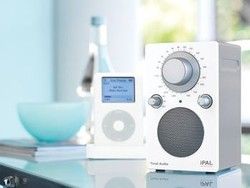Analogue radio switch-off not until 2019
At the very earliest, according to DAB specialist
The analogue radio 'switch off' point will not take place until 2019 at the very earliest, according to a leading DAB manufacturer.
Following our lengthy and revealing interview with Pure Digital earlier this month, TechRadar polled a number of manufacturers and radio industry execs to find out more about the state of play with DAB, DAB+ and the move to internet radio.
First up, we spoke with Peta Austin, Armour Home's Brand Manager who looks after the Tivoli Audio brand. Austin speaks frankly about why DAB has not been the runaway success we were initially promised and why we won't see the end of the FM signal until 2019 at the earliest.
So what is the future for radio, in your opinion?
Peta Austin: Once upon a time there was a green and pleasant land where the people listened to analogue radio and nearly everyone was happy.
But not absolutely everyone, because some people lived in sparsely populated, distant and hilly parts of the country and they could only receive 'AM' radio stations and not the better quality 'FM' broadcasts enjoyed by the vast majority. But as I said, nearly everyone was happy.
And then, along came DAB and the longest, most relentless government backed, promotional campaign in peacetime has made DAB radio a substantial but also a limited success.
Get daily insight, inspiration and deals in your inbox
Get the hottest deals available in your inbox plus news, reviews, opinion, analysis and more from the TechRadar team.
Why has DAB only had limited success?
There are a number of reasons. DAB was 'sold' to the British public with the promise of a number of unique selling points. These were: high quality digital sound with no pops, crackles or background hiss; superior programme choice, so more stations to choose from; ease of reception; ease of use and programme information, and [finally, it's] perfect for cars – no interference/tuning between areas.
Unfortunately, the reality has turned out to be rather different from the promise. While it is true there are no crackles or hiss, the high quality sound has become increasingly compressed in the rush to share the available bandwidth among [an increasing number of] stations. It is easy to use, but ten years after the launch of DAB, reception questions mean it is available to less of the population then the old FM radio system.
And what about DAB radio in cars?
Few cars have radios capable of DAB reception, so it's still too early to tell if it will ever be widely adopted. Almost no cars have DAB radios as standard, [partially] because of the prohibitive cost and also because, despite initial optimism, very few overseas countries have adopted the UK's original DAB protocol and therefore their DAB systems are incompatible with ours. [That's] problematic for car manufactures desperate to save costs by making models which transcend national boundaries.
Where do you stand on internet radio? Does it spell 'the end of DAB'?
Well, despite a massive effort and the huge volumes already sold, DAB radio has not become the runaway success everyone expected. We still tend to think DAB is 'new', [but] it's 10 years since Arcam introduced the first DAB tuner, and the latest market statistics reveal analogue radios still massively outsell DAB models by both value and volume (according to GfK). Now the inevitable march of technology has continued and a new competitor has arrived in the form of internet radio.
Will DAB sales slow and 'internet' radios win the day? I believe the answer is 'yes and no'. There can be little doubt that 'internet' radio will become a success, not least because it's already a worldwide success with many millions of listeners everyday. The problem, especially from a retailer's perspective, is the vast majority of people [currently] tuning into internet radio stations do so via their home or laptop computer and not via a dedicated 'stand alone' radio.

However, in the battle for the hearts, minds and, let's face it, hard earned pound coins of your customers, DAB seems to have shot itself in the foot at the first hurdle (to mix a metaphor or two). Why? Because DAB's most successful unique selling point over analogue radio is its superior choice of radio stations. And in this respect, internet radio beats DAB hands down, [given] its access to thousands of stations from all around the globe.
On the other hand, an internet radio requires a broadband internet connection to be available in the home and, as far as 'in-car' radio reception is concerned, the limitations of current technology mean that's just about impossible.
So when do you think we'll see the analogue 'switch off' point? People are talking around 2017/2018 as far as we're aware…
My conclusion is both digital formats will succeed, but also analogue will be with us for at least another decade. That's not sitting on the fence, it's both the logical and pragmatic conclusion. Please do not misunderstand me, I'm not suggesting DAB and internet will sit happily side by side in the home. Far from it, I believe internet radio will slowly but surely take over from DAB and analogue radio in the home, preventing DAB ever achieving the level of market dominance seen by AM/FM sets. However, DAB will eventually reign supreme in cars, probably not with pre-fitted radios, but with the ever neater add-on solutions already becoming available. In short, radio is a medium that's going to be enjoyed by increasing numbers of people, and so will our opportunity to sell them new innovative products on which to do so.

